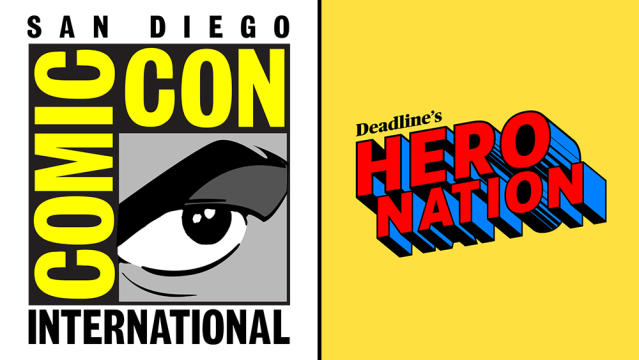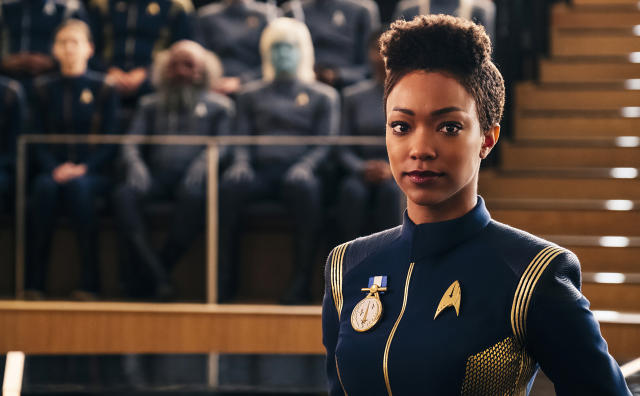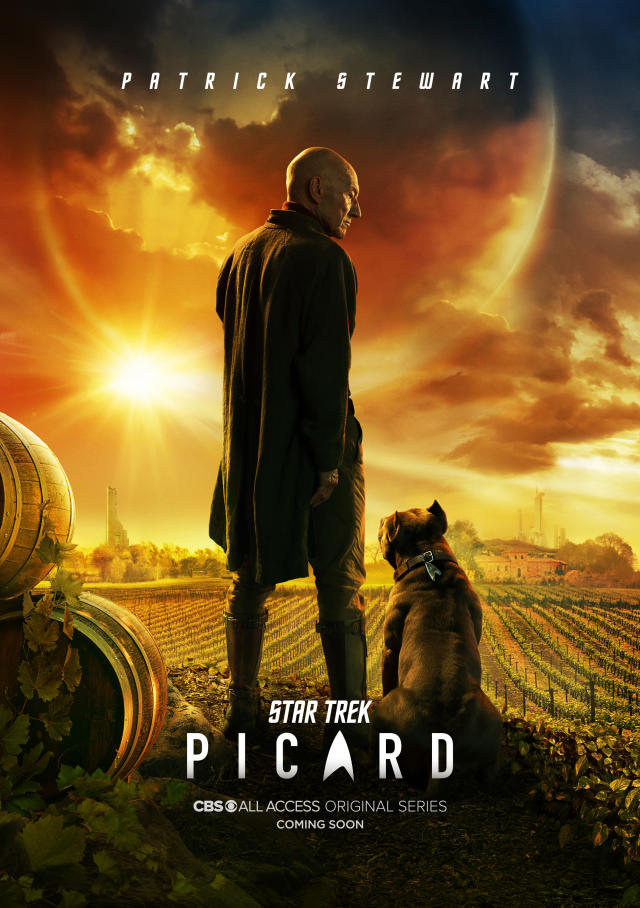‘Star Trek’ Boss Alex Kurtzman On ‘Picard’ Return, More ‘Discovery’, Hall H & A Message For Today – Comic-Con

Click here to read the full article.
“I think Picard is beloved by people because they have always seen him not just as the great philosopher captain, but as the moral center that you want every captain to be,” says Trekverse commander Alex Kurtzman of The Next Generation character and his forthcoming return in CBS All Access’ Star Trek: Picard. “He’s the person who thinks deeply, thoughtfully, strategically about what’s best, not only for his crew, but also for space, time, the future, all of the things that go beyond the span of a single life.”

More from Deadline
'Star Trek: Picard' Unveils 'Next Generation' Stars To Join CBS All Access Series - Comic-Con
'Star Trek: Lower Decks' Animated Series Reveals Cast And Promises To Bring The Funny - Comic-Con
San Diego Comic-Con will get a new look at that strategic thinker today when Kurtzman is joined on stage at the massive Hall H by Sir Patrick Stewart, as well as Star Trek: Discovery’s Sonequa Martin-Green and many members of the cast and creatives behind the streamer’s expanding franchise.
With Discovery on warp speed to its third season, Picard set to launch later this year, and the animated Star Trek: Lower Decks on display too, the nearly two-hour extravaganza promises to deliver “multiple surprises,” according to EP Kurtzman.

Before today’s mega-panel in SDCC’s mega-hall, I sat down with the Transformers alum to discuss the state of the Trekverse, where it’s going from here, and X-Men vet Stewart stepping back into the Picard role after almost 20 years. Kurtzman also revealed what today’s Hall H landing means to him and what Star Trek’s real-world mission is 2019.
DEADLINE: It was almost four years ago that it was announced that Star Trek: Discovery was taking off. Now that show is heading into a third season on CBS All Access, Picard is launching later this year, there’s the animated Lower Decks, the Shorts, a Michelle Yeoh-led series, and I know more could be brewing – what has that ride to today been like?
KURTZMAN: It’s been extraordinary and wonderful and exhilarating and terrifying and full of amazing revelations for all of us that we’ve built this universe. One of the things that I’m really most proud of and most joyful about is how many incredible people have emerged from the woodwork to declare themselves Star Trek fans, you know, and talk about how much they have wanted to work on this show.
DEADLINE: Such as?
KURTZMAN: Well, Michael Chabon, for example, wrote my favorite novel of all time, the Pulitzer Prize- winning Amazing Adventures of Kavalier & Clay.
Never in a million years would I have expected that he would’ve come to me and say I’m a huge Star Trek fan and now he is the showrunner for Picard. That’s been an incredible thing for me, and I think for everybody. So, I can’t wait for fans to see Picard, and I can’t wait for non-fans to see it, because hopefully they will see it as it’s all very recognizably Star Trek, and also, they’ll see that we’re doing something new.

DEADLINE: Speaking of something new, the end of Season 2 of Discovery sees Sonequa’s Michael Burnham and the crew heading into a worm hole and almost a thousand years into the future – which is a whole new direction and timeline, literally and figuratively, from Trek canon. So where does that take us for Season 3?
KURTZMAN: One of the things that I saw quite a bit online was how much people were recognizing our connection to canon. I saw how some people were unsure of it at the beginning, and then they came to really love it as we introduced Pike and Spock, and, by the end of Season 2, felt that we had really done it justice. And that was incredibly gratifying.
But the fun for us was actually to take the shackles off and free ourselves from established canon by jumping almost a thousand years into the future, and yet what we’re not doing is divorcing ourselves from canon.
DEADLINE: How do you mean?
KURTZMAN: Because everything that ever happened in canon is still happening, and anything that ever happened in canon still plays a major part in Season 3. None of that stuff has been forgotten. None of it has been erased.
However, what this does allow us to do is put everything in a blender and shake it up. For example, you’ll presume that a thousand years hence, things would be quite different, and so some of the species that you know, some of the people that you know, some of the histories of planets that you know, might have changed radically over that thousand years.
That’s been very interesting and very challenging because our goal, first and foremost, is always to maintain the spirit of Trek and a Roddenberry vision of Trek. Yet in order to bring it to these places, you do have to shake it up.
So, that’s really the constant conversation in the room: where are we walking the line? When are we crossing the line? When are we crossing the line too far? But I think people will see there’s a lot of love and dedication and thought has been given to Season 3 of Discovery, as it was to Season 2 and to Season 1.
DEADLINE: You mentioned dedication and, from what I know behind the scenes, that’s a hallmark of Sonequa on Discovery. Her jump from Walking Dead to Discovery, introducing Michael Burnham, a new character into the legacy, the evolution of that character and over just the first two seasons alone has been extraordinary. Where are the two of you planning on taking that character and the show itself in this new direction?
KURTZMAN: Let me start by saying that Sonequa Martin-Green is a living miracle. I mean, she’s just so extraordinary on so many fronts. She’s a brilliant actor who’s incapable of a false note, and she is a true leader on set. She is number one on the call sheet, so everything trickles down from her. She’s first to arrive, always with a smile, always generous with cast mates. She always goes the extra, extra, extra mile to support everybody and to make everybody comfortable, and she’s dedicated.
Then let me say, without giving too much away, the thing that’s really exciting for the character of Michael Burnham in Season 3 is that we get to explore a whole new side of her.
Remember, this is a character who wrestled with a choice that ended up defining her identity as a Star Fleet officer for quite some time in Season 1. She has a backstory even prior to that of really searching for her identity as a human, as a human who was raised by Vulcans, as a human who lost her human parents. She’s really been on a search, a soul search, and, you know, we always say the show’s called Discovery for a reason, and I think that what that does is make sure that each season allows these characters to discovery new sides of themselves.
DEADLINE: Specifically?
KURTZMAN: One of the things that Burnham has carried is a tremendous sense of responsibility, literally to the point that she becomes responsible for guiding Discovery into the future to save all sentient life. It’s a tremendous, tremendous burden to bear, and at what point does a regular person just break down from that? At what point does a regular person say that’s too much for me? I don’t know what to do with that. I don’t know how to carry that, and that’s a really interesting thing for us to explore with Burnham in Season 3.
DEADLINE: On that theme of exploration, what the trek, so to speak, in Star Trek: Picard, which we’ve only seen glimpses of so far with the great philosopher-captain …

KURTZMAN: I think Picard is beloved by people because they have always seen him, not just as the great philosopher captain, but as the moral center that you want every captain to be. He’s the person who thinks deeply, thoughtfully, strategically about what’s best not only for his crew, but also for space, time, the future, all of the things that go beyond, the span of a single life. We, the audience, came to see so many different sides of Picard over the many seasons of Next Gen, and you know, we came to love him. He was, in many ways, the photo inverse of Kirk in that he was not a cowboy.
DEADLINE: That’s a one way of putting it for sure. But Patrick coming back to a role that he had clearly said many times he had closed the book on after 2002’s Nemesis movie, what did that require?
KURTZMAN: You know, the fact that he wasn’t sure about returning for so many years has really set a high bar for us.
DEADLINE: How?
KURTZMAN: Well, it really meant that what we have to do now is earn his comfort and trust with the audiences, and we’re all aware of that. That is a real daily conversation in every choice that we make, and I love the idea of a show about a much, much older man who is living with the consequences, both good and bad, of the choices that he has made.
Obviously, some of that has to do with the choices he made as a captain. Some of that has to do with the choices he made in his own personal life. Picard is looking back at the sum total over the years and asking a lot of questions. As you can see from, the limited amount of stuff we’ve put out into the world so far, he’s struggling. He’s wrestling with things, and he’s wrestling with events that we will come to learn more about, maybe even this weekend.
DEADLINE: Well, I was going to ask you, Alex, what kind of surprises can we expect on stage from you guys?
KURTZMAN: (LAUGHS) You can expect multiple surprises, and I’ll leave it at that.
DEADLINE: Alex, you’re an industry veteran, but you are going to be on stage on Saturday for almost two hours talking all things Trek in the largest room at the largest genre fanfest in the world. What is that like for you as a creator and as a fan?
KURTZMAN: Oh, man, it feels like so many things, it’s hard to put into words. I wish I could say it feels like complete victory, but that would be false.
DEADLINE: Why?
KURTZMAN: Because to me, this is a step along a very long road.
Here’s what I can tell you: if we can tell stories that have really positive messages, like the message in Star Trek, that actually change the conversation both about what genre can be now and the way we need to get over the visions that have really made this world a very, very complicated and sometimes terrible place to be. If we can put that out into the universe and inspire people to be better, to think better, to think positively, to see that we’re all really the same underneath all of our differences, then that makes me happy.
I feel like that’s the mission that Star Trek has taken on now. It’s not just to expand the universe and have more shows. It is to send out that positive vision of the future at a time when I think we need it most. That’s Star Trek to me now.
Sign up for Deadline's Newsletter. For the latest news, follow us on Facebook, Twitter, and Instagram.

